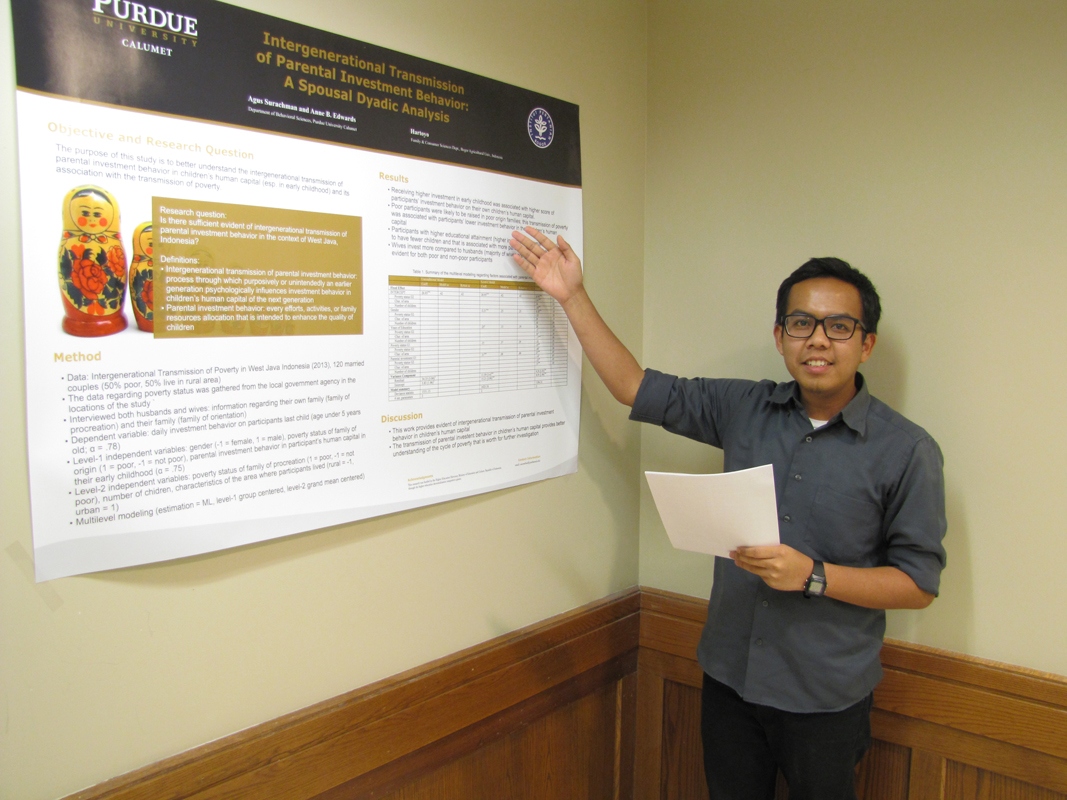Agus Surachman says that growing up in poverty influenced his interest in human development and family studies (HDFS) and the related research he has generated in the field as an undergraduate and graduate university student.
After receiving his master’s degree at Purdue University Calumet Dec. 12, the 26-year-old Indonesia native looks forward to furthering his study in a Ph.D. program.
“When you experience something like (poverty),” the youngest of four siblings said, “you become passionate about it.”
Passionate about his study program
Surachman also became passionate about his program of study despite being arbitrarily assigned to it as an undergraduate student at Bogor Agricultural University in Indonesia.
“I decided I’d just take it, and it’s a good thing because I love it,” Surachman said. “[HDFS] is learning about yourself. All humans are part of one big family, and family is a big part of life.”
As a student of the discipline, he also became passionate about related research opportunities, a key reason, he said, he pursued his master’s degree at Purdue Calumet.
Dynamic process of poverty
As an undergraduate student, Surachman researched what he calls the dynamic process of poverty. Through research and his own experiences, he determined that an investment of human capital—particularly education—is an effective way to escape an environment of poverty.
Surachman said he knows this is true because he has experienced it personally, having earned scholarships to finance his high school and college education.
“[Growing up] I realized that I had to be independent,” he said. “I realized that education is very, very important.”
So for him also has been his research. In fact, a study he conducted during 2013-14 in Indonesia was recently published in The Journal of Family and Economic Issues. Cited in the publication was comparative data he produced about poor and non-poor participants relative to the dynamics of poverty and parental investment in human capital, especially formal education.
While studying at Purdue Calumet, he advanced his research working closely with instructors like Associate Professor of Human Development and Family Studies Anne Edwards.
“His work was excellent,” she said. “The thing about Agus is that he is the ultimate self-starter. I’ve been giving him guidance, but he comes to me with the ideas.”
Aspiring professor
Surachman said that his ultimate aspiration is to become a tenure track professor at an American university. Playing “teacher,” he recalled, was a favorite childhood activity of his.
He said he remembers telling one of his school principals that he wanted to be a professor when he grew up and believes Purdue Calumet has helped him get on track.
“Enrolling [at Purdue Calumet] was a very good transition,” he said. “I really feel grateful, because studying here helped me take time to realize what I wanted to do next.”
Surachman added he is grateful to everyone from Indonesia and Purdue Calumet who have helped him further his aspirations.
“Sometimes, a bad situation isn’t a bad situation if you can see the ‘silver lining’,” he said.

